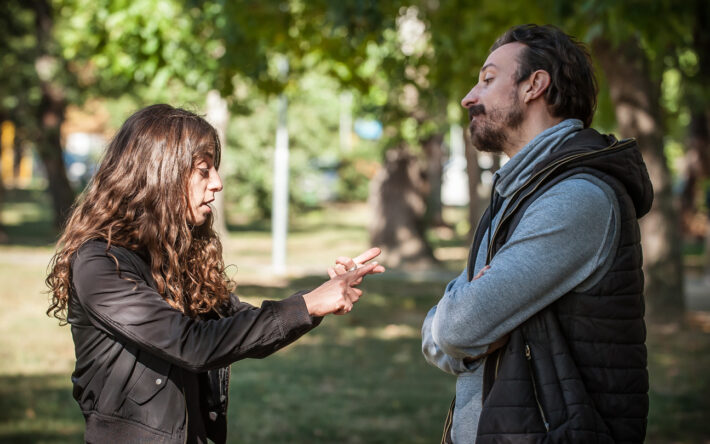Not every breakup comes with shouting, betrayal, or a dramatic ending.

Some relationships just sort of quietly unravel bit by bit. It’s subtle—weeks blur into months, the vibe shifts, and one day you realise you’re not really in it anymore. These endings can be even harder to understand because nothing obvious went wrong. But there were signs. They just didn’t scream—they whispered. If you’re wondering how good relationships fade without any major fallout, here’s what to watch for.
1. You stop reaching for each other during everyday moments.

It’s not just about physical touch—it’s about all the little ways you used to connect. A quick hand on the shoulder, a glance across the room, a shared inside joke. When those start disappearing, the relationship loses its warmth before either of you fully notice. That drift happens slowly. It’s not one big withdrawal; it’s a series of missed chances to stay emotionally close. As time goes on, that silence becomes the new normal.
2. Conversations turn into logistics only.

You still talk—but it’s about bills, schedules, plans, and errands. Nothing personal. Nothing vulnerable. Just task management. It feels like you’re running a household together, not building a life emotionally connected to each other. When the day-to-day takes over and deeper connection fades, it doesn’t feel like a fight—it just starts to feel like flatness. That emptiness can quietly pull people apart.
3. You start keeping small thoughts or feelings to yourself.

Maybe you used to share everything, even silly observations or half-formed ideas. Now you catch yourself thinking, “What’s the point?” or “They won’t really care.” So you stay quiet. And they do the same. Withholding in that way creates space between you—not the good kind, but the kind that grows into disconnection. Intimacy isn’t just about the big talks; it’s about being able to share the small, daily stuff too.
4. Affection starts to feel like an obligation.

There’s a difference between kissing someone because it feels natural and doing it because you feel like you should. When affection becomes mechanical or stops altogether, it often means emotional distance has crept in. That doesn’t always mean something terrible has happened. Sometimes it’s just that the relationship has become more about habit than connection, and neither of you really knows how to fix it.
5. You stop imagining a future together.

In healthy relationships, people naturally picture plans, holidays, or little milestones. When that stops happening—or starts feeling like a chore—it’s often a sign that something has emotionally disengaged beneath the surface. You might still be together, technically, but your mind has started separating. The connection that fuels future-building has weakened, even if nothing dramatic triggered it.
6. One of you always feels like the initiator.

Whether it’s starting conversations, suggesting plans, or trying to fix issues, it feels one-sided. And the partner who keeps doing the work starts to feel tired, resentful, or unappreciated. That imbalance doesn’t always explode into an argument. Sometimes, it just leads to quiet emotional burnout, and eventually, one person detaches for good because they’re exhausted by the effort.
7. There’s more politeness than honesty.

You don’t argue much, but not because you’re totally aligned. It’s because you’re tiptoeing. Being “nice” has replaced being real. You avoid tension instead of resolving it. It can feel peaceful at first, but underneath the surface, it breeds frustration and confusion. A relationship that can’t hold honesty eventually loses depth and trust.
8. You don’t really miss each other anymore.

There was a time when being apart made you feel something—longing, excitement, even just curiosity. Now it’s mostly relief, indifference, or nothing at all. You’ve started getting used to distance. That lack of missing doesn’t mean you hate each other. It just means the emotional tether has frayed. When neither person feels pulled back in, the connection struggles to survive.
9. Effort becomes optional instead of automatic.

In healthy relationships, you show up because you want to—not because you feel forced to. When things start slipping—forgetting important dates, brushing off their feelings, stopping small acts of care—it often means your heart’s no longer in it. You might still be kind, but kindness without presence eventually turns into distance. When effort fades, so does the sense of being valued.
10. Emotional safety slowly dissipates.

You don’t feel like you can fully say what you mean without being misunderstood, dismissed, or ignored. So, you start editing yourself, and they start doing the same. Before you know it, filtering becomes a habit. As time goes on, that lack of safety creates more than just communication problems. It creates emotional loneliness, even when you’re still physically together.
11. Your lives are running parallel, not intertwined.

You go through your days, do your routines, handle your responsibilities, but it feels like you’re doing it beside each other, not with each other. There’s no shared spark, no active weaving of your lives together anymore. When this happens for too long, the relationship turns into coexistence. Most people don’t realise it’s happened until they already feel like strangers.
12. You’re not curious about each other anymore.

In the beginning, you wanted to know their thoughts, feelings, opinions, and ideas. Now? You assume you already know, or you don’t feel like asking. That curiosity has quietly faded. That loss of interest doesn’t mean you’ve stopped caring. It usually means the energy that fuels emotional engagement hasn’t been fed for a while. Without curiosity, connection starts to thin out.
13. One or both of you starts focusing more on outside validation.

Whether it’s friends, work, social media, or hobbies—other spaces start providing more emotional reward than the relationship. It doesn’t have to be cheating—it’s more like emotional outsourcing. The change can be subtle at first. But when the relationship stops feeling like a place of comfort or affirmation, people naturally look elsewhere, and that’s often where the real disconnection begins.
14. You avoid talking about the state of the relationship.

You know something feels off, but neither of you brings it up. Maybe out of fear, or fatigue, or just not wanting to rock the boat. But that silence doesn’t fix anything—it just lets the gap grow wider. When a relationship can’t hold difficult conversations, it loses its ability to repair. Without repair, even the strongest foundations start to crack.
15. You feel lonelier with them than you do on your own.

This is often the quietest but clearest sign that something’s wrong. It’s that ache of being physically close to someone but feeling emotionally far away. You still do things together, but the connection feels thin, surface-level, or gone. That kind of loneliness is what breaks relationships quietly. It doesn’t scream; it just slowly convinces you that you’d feel more yourself without the weight of staying in something that no longer holds you.




